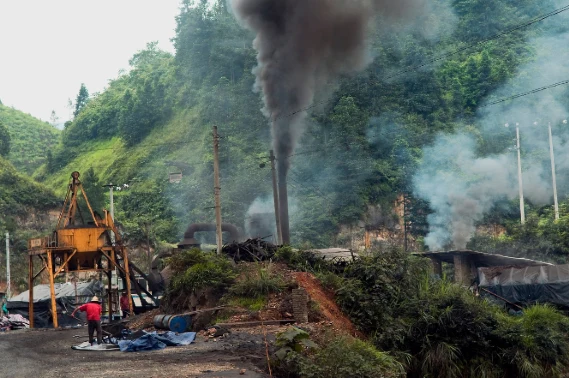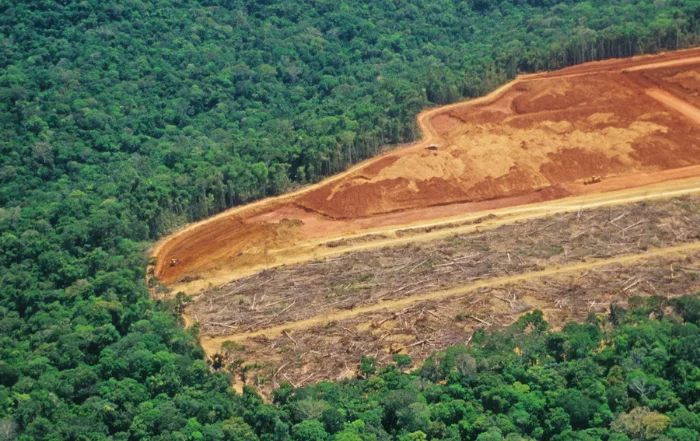In the face of towering trees and lush canopies lie silent battles waged against our planet’s most precious ecosystems—forests. These vital habitats, home to an astounding array of species and guardians of our climate, are facing a relentless assault from various threats.
From deforestation for agriculture to rampant logging, mining, and infrastructure development, the list of perpetrators is distressingly long.
As global citizens, it is crucial for us to understand these threats and recognize the urgency of finding sustainable solutions. Join us as we delve into the depths of this pressing issue, unraveling the greatest threats to forests and exploring the transformative actions needed to secure their future.
Deforestation for Agriculture
One of the leading causes of forest loss is the conversion of land for agriculture, particularly large-scale commercial farming. Companies involved in the production of commodities like palm oil, soy, beef, and timber contribute significantly to deforestation.
For instance, global agricultural giants such as Cargill, Wilmar International, and JBS have been linked to deforestation in the Amazon rainforest.
Logging and Timber Harvesting
Illegal and unsustainable logging practices pose a significant threat to forests worldwide. Logging companies driven by profit often engage in clear-cutting and illegal logging, devastating vast areas of forest. Illegal logging is a significant issue in countries such as Indonesia, Russia, and the Democratic Republic of Congo.
Companies like Asia Pulp & Paper (APP) and Rimbunan Hijau have faced scrutiny for their involvement in destructive logging practices, along with JBS and Cargill.
Mining and Extractive Industries
The demand for minerals, metals, and fossil fuels power the destructive mining activities that encroach upon forested areas. Industries such as coal mining, oil and gas extraction, and gold mining can result in extensive deforestation, soil erosion, pollution, and habitat destruction.
Companies like ExxonMobil, Rio Tinto, and Chevron have faced criticism for their role in forest degradation through mining operations.
The extraction of gold in the Amazon rainforest by companies like Yanomami Mining, and coal mining in Indonesia by companies like PT Adaro Energy, have also caused significant deforestation and ecological damage.
Infrastructure Development
The construction of roads, dams, and other infrastructure projects can lead to widespread deforestation and habitat fragmentation.
Large-scale projects like hydroelectric dams and road networks can disrupt forest ecosystems, displacing wildlife and disrupting crucial ecological processes. Nations undertaking infrastructure development, including China and Brazil, have faced scrutiny for their impact on forested areas.
The Belo Monte Dam project in Brazil’s Amazon rainforest and road construction for palm oil plantations in Southeast Asia have resulted in large-scale forest loss.
Industrial Agriculture
The expansion of industrial agriculture has led to widespread deforestation, habitat destruction, and the use of harmful agrochemicals. Large-scale single-crop plantations and intensive livestock farming practices contribute significantly to forest loss and environmental degradation.
Industrial agriculture involves the cultivation of a single crop on a massive scale, often for export markets, resulting in the clearing of vast forested areas. For example, the expansion of soybean plantations in the Amazon rainforest has been a major driver of deforestation in Brazil. Companies like Cargill, a leading global agricultural corporation, have faced criticism for their involvement in soy production linked to deforestation.

In addition to deforestation, industrial agriculture relies heavily on chemical inputs, such as synthetic fertilizers and pesticides, which have detrimental effects on ecosystems and water quality. These chemicals can leach into rivers and streams, causing pollution and harming aquatic life. Furthermore, the intensification of livestock farming, including concentrated animal feeding operations (CAFOs), contributes to deforestation through the clearing of land for grazing and feed production.
Companies like Tyson Foods, one of the largest meat producers globally, have been under scrutiny for their contribution to deforestation and environmental degradation through unsustainable livestock practices.
Climate Change
The increasing impacts of climate change, including rising temperatures, altered precipitation patterns, and extreme weather events, pose a significant threat to forest ecosystems. Forests are vulnerable to drought, wildfires, and pests, leading to degradation and increased susceptibility to further threats. While not attributed to specific companies or nations, the global reliance on fossil fuels and greenhouse gas emissions are major contributors to climate change.
Countries with significant forested areas, such as Brazil, Indonesia, and the Democratic Republic of Congo, are particularly vulnerable to climate change impacts on their forests.
Illegal Wildlife Trade
Poaching and smuggling of endangered species lead to habitat destruction and disrupt ecological balance.
The illegal trade in tropical timber often goes hand-in-hand with the illegal wildlife trade, such as the illegal logging and wildlife trade in the forests of Southeast Asia.
Wildlife trafficking networks operate globally, and nations with significant markets for illegal wildlife products, such as China and the United States, play a role in fueling this destructive trade.
Unsustainable Agriculture Practices
Apart from deforestation, unsustainable agricultural practices such as heavy pesticide and fertilizer use, monoculture farming, slash-and-burn farming, and soil degradation deeply harms forest ecosystems.
The expansion of industrial-scale agriculture, including agribusinesses like Cargill, Monsanto (now owned by Bayer) and Syngenta, has been linked to ecological degradation and the loss of biodiversity.
Large-scale palm oil plantations in Southeast Asia and soybean plantations in the Amazon are associated with deforestation and the use of harmful agricultural practices.
More To Discover
- Alarmingly High Deforestation for Rubber Plantations Surpasses Previous Estimates
- The Bittersweet Truth: New Research Sheds Light on the Environmental Toll of Cocoa Farming in West Africa’s Forests
- Indonesia Imposes $310M in Fines on Palm Oil Companies for Illegal Forest Operations
- Flatpacked Forests: Ikea’s Timber Controversy and the Flaws in FSC Certification
Global Consumer Demand
The consumption of forest-derived products plays a significant role in driving deforestation worldwide. The demand for commodities like timber, paper, palm oil, and soy has indirect but profound implications for forest loss.
Palm Oil: The production of palm oil, a versatile vegetable oil used in a wide range of consumer goods, including food, cosmetics, and biofuels, has been linked to large-scale deforestation in Southeast Asia and other tropical regions. Companies like Nestlé, one of the world’s largest food and beverage companies, have faced criticism for their sourcing practices, as they rely on palm oil supplied by plantations associated with deforestation.
Paper and Pulp: The global demand for paper products, including packaging materials, tissue, and printing paper, contributes to deforestation. Companies such as Procter & Gamble (P&G), a multinational consumer goods corporation, have been under scrutiny for their sourcing of pulp from suppliers linked to deforestation. Responsible paper sourcing and the promotion of recycled paper products are crucial for mitigating the impact on forests.
Beef and Soy: The production of beef and soybeans also drives deforestation, primarily in South America, particularly the Amazon rainforest. Companies involved in the fast-food industry, like McDonald’s, have been associated with deforestation through their sourcing of beef and soy products. Ensuring sustainable practices in livestock farming and supporting responsible soy production are essential for curbing forest loss.
Timber: The demand for timber and wood-related products, such as furniture and construction materials, contributes to illegal logging and deforestation globally. Ensuring the legality and sustainability of timber sourcing is a crucial step in reducing the impact on forests. Several companies have made commitments to responsible timber sourcing, while others, such as IKEA, have implemented strict guidelines to ensure sustainable wood procurement.
Addressing global consumer demand requires a multi-faceted approach that involves companies adopting sustainable sourcing practices, governments enforcing robust regulations, and consumers making informed choices. Certification systems, such as the Forest Stewardship Council (FSC) for timber and the Roundtable on Sustainable Palm Oil (RSPO) for palm oil, play a vital role in promoting responsible production and helping consumers identify products with lower environmental impacts.
By supporting companies that prioritize sustainability and making conscious choices as consumers, individuals can contribute to reducing the demand for products linked to deforestation. Moreover, advocating for stricter regulations and transparency in supply chains can help ensure that companies align their practices with the preservation of forests and biodiversity.
It’s important to note that while specific companies and countries are mentioned as examples, the responsibility for forest loss extends beyond them, involving complex supply chains and global consumer demand. Addressing these threats requires collaborative efforts involving governments, businesses, and consumers to promote sustainable practices, responsible sourcing, and stronger environmental regulations.



















